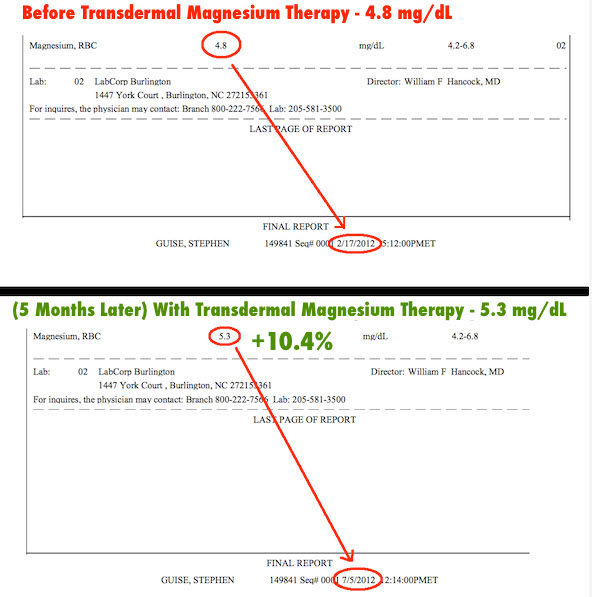50 Studies Suggest That Magnesium Deficiency Is Killing Us
By David
August 8, 2013 • Fact checked by Dumb Little Man

A silent epidemic marches on unchallenged, claiming lives by way of misery or death.
Experts estimate that 50% to 80% of Americans are deficient in magnesium – a vital mineral involved in more than 300 enzymatic processes at the cellular level. And that’s because 68% of American adults consume less magnesium than the recommended daily allowance (RDA), according to a 2005 nationally representative survey.
This isn’t just about Americans (though we have it bad) – a great number of people from all over the world are magnesium deficient. And it’s killing us.
We Need More Magnesium To Live
The number of problems that can arise from insufficient magnesium are exhausting to recite because magnesium is found and used everywhere in your body – bones, muscles, every single organ, hair, nails, and blood. So let’s skip the many ailments caused by low magnesium levels and look at death.
Killer Diseases Of The World
• Cancers killed 7.6 million people in 2008 (all types combined)
• Ischaemic heart disease killed 7 million people in 2011
• Stroke killed 6.2 million people in 2011
• Diabetes killed 1.4 million people in 2011
(Data from World Health Organization and American Diabetes Association)
Here we have four of the top killers in the world – cancer, heart disease, stroke, and diabetes. Not only do these diseases kill, but they often reduce quality of life, sometimes dramatically. They’re enemies of the human race.
With that in mind, take a look at this…
Diabetes: In a meta analysis of 13 cohort studies, 536,318 participants, and 24,516 cases of diabetes, increased magnesium intake was found to be “significantly” inversely correlated with type 2 diabetes. (source)
Stroke: In a meta analysis of 7 studies, 241,378 participants, and 6,477 cases of stroke, increased magnesium intake was found to have a “modest, but statistically significant” inverse correlation with stroke risk. (source)
Ischaemic Heart Disease: In a meta analysis of 16 studies and 313,041 individuals, there were 11,995 Cardiovascular Disease cases and 7,534 of those were Ischaemic Heart Disease (2,686 of which were fatal IHD events). They concluded that “circulating and dietary magnesium are inversely associated with CVD risk.” (source)
Low magnesium levels are also the best predictor of heart disease.
Cancer: In a meta analysis of 8 studies, 338,979 participants, and 8,000 Colorectal Cancer cases, increased magnesium intake was associated with “a modest reduction in the risk of CRC, in particular, colon cancer.” (source)
Other research suggests that magnesium deficiency increases cancer risk significantly.
All four of these major non-communicable diseases are tied to low magnesium levels or their risk is significantly reduced by increased magnesium intake. I don’t see why anyone would be surprised – magnesium is required for your body to function correctly and most of us are too low in it.
A Note On Cancer And Magnesium
I did find one interesting review which suggested that magnesium has “a complex relationship with cancer.” Since this was the only negative magnesium information I found from a reliable source, I wanted to address it. Here is the key excerpt:
“In magnesium-deficient mice, low magnesium both limits and fosters tumorigenesis, since inhibition of tumor growth at its primary site is observed in the face of increased metastatic colonization. Epidemiological studies identify magnesium deficiency as a risk factor for some types of human cancers.” (source)
It says that the tumors of magnesium-deficient mice didn’t grow as fast, but that the cancer metastasized more. And that’s especially interesting, because cancer stages I-IV are defined by the level that the cancer has metastasized (spread). I don’t see this as complex at all. Metastasizing cancer is far deadlier and more difficult to treat than a single tumor growing, which is why the worst stage of cancer – stage IV – is marked by significant metastasizing of the cancer.
To me, it appears that higher magnesium levels helped to protect the healthy areas of the mouse from cancer. And even with higher tumor growth, doesn’t this support the idea that higher magnesium levels contain the cancer by confining growth to the affected area?
In light of magnesium’s proven importance for health and proper body functioning, and far more evidence of its deficiency being carcinogenic and its higher consumption being anti-cancerous (in human and mice studies alike), I wouldn’t worry about this.
The Best Ways To Increase Your Magnesium Levels
If you can get adequate magnesium from food, that’s ideal, but most of us don’t, and would benefit from supplementing another source of magnesium (consult your doctor, especially if you take medication).
After food, my top recommendation is magnesium oil:
1. Eat magnesium-rich foods
2. Apply magnesium oil to your skin
3. Soak in epsom salt baths
4. Take magnesium citrate orally
About Magnesium Oil
“Magnesium Oil” isn't technically an oil – it’s magnesium chloride brine (i.e. a water-based solution). The directions are to spray and rub it into skin for absorption – a process called transdermal magnesium therapy.
What it helps with: low magnesium levels, stress, muscles (soreness, spasms, injuries, tension), tendonitis, inflammation (especially near the skin’s surface), headaches, heart health, general health, and disease prevention
How it works: Magnesium relaxes muscles, while calcium contracts them, and the two minerals balance each other out. But most diets today are heavy in calcium and too low in magnesium, and this can create a severely lopsided calcium-to-magnesium ratio (bad news). This is why restoring low magnesium levels makes people feel noticeably more relaxed.
While we know that magnesium improves skin health when applied, some may wonder whether rubbing magnesium chloride onto your skin is effective for restoring magnesium levels internally. Epsom salt baths – historically used for sore, tired, and tense muscles – have already been shown to increase magnesium levels internally and are a good option. But some evidence suggests that magnesium oil might work even better.
Evidence That Magnesium Oil Really Works
I got two comprehensive blood tests in 2012, taken five months apart. The following screenshot shows my magnesium RBC levels for each test – February and July. The Magnesium RBC test measures the amount of magnesium present at the cellular level in red blood cells (this is said to be the most accurate test for total magnesium levels).
After the initial test showed me on the lower end of magnesium levels, but still within the acceptable range, and because I had tension/anxiety, I decided to try transdermal magnesium therapy before my next test. Here’s what happened…
For approximately three of these five months, I applied magnesium oil to my body once or twice a day. It resulted in a 10.4% increase in my magnesium RBC levels on my next test.
This data explains why I was more relaxed, slept better, and had fewer muscle twitches (exactly what magnesium is known to help with). I did and still do apply magnesium oil directly to twitching muscles, and sometimes it stops them in seconds; I also use it to recover from workouts faster and with less soreness.
One month ago, I jammed my left middle finger playing basketball, and the second knuckle from the fingertip turned blue over the few next hours. The deep bruised color (and the pain) faded less than three minutes after applying magnesium oil around the affected area. It was incredible to see it work so quickly.
Anecdotal claims like this are not always reliable, which is why I emphasize that my blood tests align with my experience.
There aren’t many studies on transdermal magnesium therapy. You can see above that it has worked really well for me, but because it’s new and, like many natural remedies, few people have the incentive to spend the money to research it, there are no big studies. Personal experiences, reviews, and a couple of small studies are very promising though.
One pilot study involved a regimen of 20 sprays of magnesium oil and a 20 minute magnesium foot bath per day over a period of 12 weeks. The study had just nine people, but eight of the nine increased their magnesium levels, and the average change for all nine people was a 59.7% increase. That’s huge! (source)
Early evidence suggests that magnesium oil is an effective way to increase magnesium levels, perhaps more so than epsom salt baths, but either or both methods can be used to supplement magnesium and support general and muscle health.
Oral magnesium supplements, while convenient and easy, can cause loose stools and appear to be less effective than transdermal therapy or epsom salts, but they are still meaningful towards restoring magnesium. If you decide to take an oral supplement, go with magnesium citrate, not magnesium oxide supplements, which have a very poor absorption rate of 4%.
Other Interesting Magnesium Studies
1. Magnesium sulfate via IV injection is an effective migraine remedy – “Both the response rate (100% for magnesium sulfate and 7% for placebo) and the pain-free rate (87% for magnesium sulfate and 0% for placebo) showed that magnesium sulfate was superior to placebo.” (source)
2. A magnesium sulfate shot appears to be an effective heart attack treatment (if you have a heart attack, ask for it).
3. In a study of ADHD children, magnesium deficiency was found in 95% of the 116 children tested. (source)
I hope this article has convinced you of the importance of magnesium, and that magnesium oil works. If you want more researched, helpful articles like this, try subscribing to Deep Existence. You’ll get my stress-relieving ebook and 40 focus-inducing wallpapers as gifts. Every Tuesday, I’ll send you an email with great information on how to stay focused, which is the “magnesium of personal development” if you know what I mean. 🙂
Cheers,
Stephen
 | Written on 8/8/2013 by Stephen Guise. Besides writing for his own blogs Stephen is a featured writer here at Dumb Little Man. Be sure to stop by Stephen's ‘featured writer page‘ right here on Dumb Little Man to find links to more of his articles. |
Photo Credit: gwire


